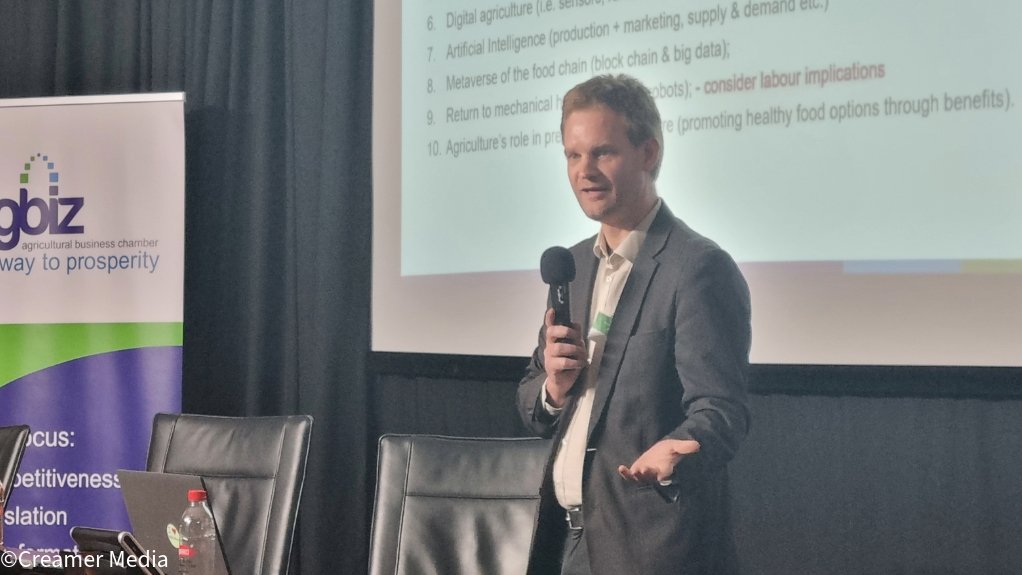Agri trade poised to benefit from South Africa’s global positioning next year, but BRICS needs work



Agbiz CEO Theo Boshoff
Photo by Creamer Media's Marleny Arnoldi
Agbiz chief economist Wandile Sihlobo
Photo by Creamer Media's Marleny Arnoldi
With the 2024/25 season expected to benefit from La Niña rains, solid exports having been reported in the year-to-date, food price inflation having come down to 2.8% in October and the Agribusiness Confidence Index having increased by ten points to 58 in the fourth quarter of the year, experts are optimistic that the agriculture sector will grow meaningfully in 2025.
During a media day hosted by the Agricultural Business Chamber of South Africa (Agbiz) on December 6, CEO Theo Boshoff said the sector would benefit further from political stability effected by the Government of National Unity, progress with rail reforms, improved energy security and South Africa’s positioning within BRICS and in leading the Group of 20 (G20) next year.
The threats to the sector, however, include rising protectionism globally, geopolitical instability that impacts on prices and supply chain activity and green trade barriers.
Agbiz chief economist Wandile Sihlobo pointed out that the reaction of countries such as China to new import tariffs imposed by the US may cause disruption in the global agriculture market. Hence, he emphasised the importance of expanding agriculture exports into the new BRICS Plus member countries for diversification – including Egypt, Ethiopia, Iran and the United Arab Emirates.
China remains a vital market for South Africa’s agricultural exports, with China accounting for 10% of fresh produce purchases globally every year and the country continuing to have a deficit in its food balance.
The BRICS Plus countries, on the other hand, now accounted for half of global agricultural output and imports alike. Agbiz said an agriculture trade agreement between the BRICS Plus members was needed to enable more trade between the nations. Sihlobo pointed out that BRICS Plus was currently more of a political formation than an economic formation, since intra-BRICS trade remained low.
Currently, the BRICS countries account for a small share of South Africa’s agricultural exports at 8% over the past ten years. This while the original BRICS countries, before the additional members added in 2023, imported an average $300-billion worth of agricultural products every year.
“As BRICS matures from the political front, deepening regional economic integration and trade is the most logical step towards expanding the ambition of the group, particularly in agriculture,” Sihlobo said.
He added that Brazil, South Africa and Russia typically have large surpluses of products that India and China import from the world market. “Reducing import tariffs and other non-tariff barriers, or the opening of tariff rate quotas for specific agricultural products would help expand the level of ambition in a more meaningful way.”
Sihlobo emphasised the importance of BRICS Plus formulating an intergovernmental working group that explored the scope for reducing import tariffs and removing non-tariff barriers, including on phytosanitary protocols, among the members, as well as developing terms of reference that established the work of a negotiation platform between the members.
In turn, the G20 represents 80% of global trade and 75% of global GDP, which can bode well if South Africa uses this platform to advance agriculture trade agreements, sustainable food systems and overall agriculture development.
Boshoff said Brazil, as the G20 leader for 2024, left much for South Africa to build on, including its policy recommendations on a non-discriminatory and equitable multilateral agricultural trading system, eliminating market-distorting barriers and financing mechanisms for decarbonisation.
Brazil also recommended changes to customs processes and procedures and reforming the World Trade Organisation’s Dispute Settlement Body.
South Africa exported $10.5-billion worth of agricultural goods in the year-to-date, marking a 4% increase on the same months of 2023. Notably, 2023 was a record year for agricultural exports at $13.2-billion.
South Africa was the thirty-second largest agricultural exporter globally in 2023 and the only African country within the world's top 40 largest agricultural exporters.
Agbiz fruit desk manager Wolfe Braude pointed out that the fruit sector had already signed various sanitary and phytosanitary protocols with countries such as Thailand, Japan, India and Vietnam, which should bode well for fruit exports next year.
However, these agreements are vulnerable to unilateral action, since no legal frameworks or dispute resolution mechanisms are in place.
He added that exports from South Africa may increase following the country joining the Guided Trade Initiative in January 2024, which forms part of the African Continental Free Trade Area. There are also plans to develop a portal for sanitary and phytosanitary notification and information sharing between African countries.
Braude said a study by the Southern African Customs Union on using existing agreements and potential new trade agreements may support more agricultural trade within the region.
Moreover, Agbiz is awaiting the outcome of a review of the preferential trade agreement African countries have in place with the US, called the African Growth and Opportunity Act, which is expected next year.
Although South Africa’s eligibility risks have lessened, it remains uncertain whether the country will be included in the renewal, Braude said.
Domestically, Boshoff said, various policy and other fundamental changes were in store for the freight rail sector in 2025, including the Freight Logistics Roadmap and more open access to the freight system once Transnet publishes its network statement.
With rising green trade barriers globally, Agbiz deemed it prudent to publish a risk assessment methodology for environmental, social and governance (ESG) matters for the agriculture sector. Having hosted workshops and published a position paper earlier this year, Agbiz hoped to guide the industry on the changing sustainability landscape to help producers remain competitive.
The organisation’s ESG roadmap address environmental metrics such as water security, pollution and waste, biodiversity and land-use; social metrics such as labour standards, human rights, community development, customer responsibility and supply chain; and governance metrics such as ethical behaviour, board composition, remuneration, risk management and tax transparency.
Article Enquiry
Email Article
Save Article
Feedback
To advertise email advertising@creamermedia.co.za or click here
Press Office
Announcements
What's On
Subscribe to improve your user experience...
Option 1 (equivalent of R125 a month):
Receive a weekly copy of Creamer Media's Engineering News & Mining Weekly magazine
(print copy for those in South Africa and e-magazine for those outside of South Africa)
Receive daily email newsletters
Access to full search results
Access archive of magazine back copies
Access to Projects in Progress
Access to ONE Research Report of your choice in PDF format
Option 2 (equivalent of R375 a month):
All benefits from Option 1
PLUS
Access to Creamer Media's Research Channel Africa for ALL Research Reports, in PDF format, on various industrial and mining sectors
including Electricity; Water; Energy Transition; Hydrogen; Roads, Rail and Ports; Coal; Gold; Platinum; Battery Metals; etc.
Already a subscriber?
Forgotten your password?
Receive weekly copy of Creamer Media's Engineering News & Mining Weekly magazine (print copy for those in South Africa and e-magazine for those outside of South Africa)
➕
Recieve daily email newsletters
➕
Access to full search results
➕
Access archive of magazine back copies
➕
Access to Projects in Progress
➕
Access to ONE Research Report of your choice in PDF format
RESEARCH CHANNEL AFRICA
R4500 (equivalent of R375 a month)
SUBSCRIBEAll benefits from Option 1
➕
Access to Creamer Media's Research Channel Africa for ALL Research Reports on various industrial and mining sectors, in PDF format, including on:
Electricity
➕
Water
➕
Energy Transition
➕
Hydrogen
➕
Roads, Rail and Ports
➕
Coal
➕
Gold
➕
Platinum
➕
Battery Metals
➕
etc.
Receive all benefits from Option 1 or Option 2 delivered to numerous people at your company
➕
Multiple User names and Passwords for simultaneous log-ins
➕
Intranet integration access to all in your organisation


















